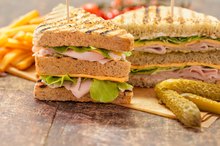What does fact checked mean?
At Healthfully, we strive to deliver objective content that is accurate and up-to-date. Our team periodically reviews articles in order to ensure content quality. The sources cited below consist of evidence from peer-reviewed journals, prominent medical organizations, academic associations, and government data.
The information contained on this site is for informational purposes only, and should not be used as a substitute for the advice of a professional health care provider. Please check with the appropriate physician regarding health questions and concerns. Although we strive to deliver accurate and up-to-date information, no guarantee to that effect is made.
Diet With Foods That Are Easy to Digest
If you suffer from gastrointestinal problems, such as irritable bowel syndrome, gastoesophageal reflux disease or indigestion, it's important to eat foods that are easy to digest in order to prevent discomfort 1. Some foods are digested more easily than others, according to the National Digestive Diseases Information Clearinghouse.
Low-Fiber Grains
Carbohydrate-containing foods are among the more easily digested food groups, reports the Seattle Cancer Care Alliance, but fiber is not digestible and may cause bloating or diarrhea. Limit your intake of grains with more than two grams of fiber per serving, such as whole grains, brown rice and high-fiber cereals. Bagels, white bread, cornmeal, white flour and white rice are generally easy to digest.
Lean Protein
List of Roughage Foods
Learn More
Protein is another type of food that digests easily. When choosing protein foods, select those that are lower in fat. Choose crab and imitation crab, lean cuts of fish, skinless poultry or ham, canned tuna, lean lunch meat such as:
- turkey,
- low fat hot dogs
Avoid fatty proteins such as corned beef, pepperoni and fried meats.
Fruit and Fruit Juice
Although fruits generally digest well, citrus fruits and fruit juices may lead to heartburn. Some fruit juices may naturally contain sorbitol, a type of sugar which may cause diarrhea. Stick to 2 or more 1/2-cup servings of fruit or fruit juice per day, recommends the Seattle Cancer Care Alliance 1. Cranberry, cran-raspberry and fruit nectars are good juice choices.
- Although fruits generally digest well, citrus fruits and fruit juices may lead to heartburn.
Well-Cooked Vegetables
Is It Okay to Eat Ground Flax Meal With Diverticulosis?
Learn More
Well-cooked vegetables are easier to digest than raw vegetables, which may be associated with gas and bloating. Choose 2 or more 1/2-cup servings of cooked vegetables, such as:
- asparagus tips
- beets
- carrots
- green beans
- lettuce
- mushrooms
- pumpkin
Consume potatoes without skin and added fat.
Related Articles
References
Writer Bio
Jennifer Byrne is a freelance writer and editor specializing in topics related to health care, fitness, science and more. She attended Rutgers University. Her writing has been published by KidsHealth.org, DietBlogTalk.com, Primary Care Optometry News, and EyeWorld Magazine. She was awarded the Gold Award from the American Society of Healthcare Publication Editors (ASHPE), 2007, and the Apex Award for Publication Excellence.









